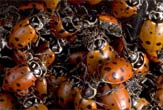Global Warming Could Trigger Insect Population Boom

A rise in the Earth's temperature could lead to an increase in the number of insects worldwide, with potentially dire consequences for humans, a new study suggests.
New research shows that insect species living in warmer areas are more likely to undergo rapid population growth because they have higher metabolic rates and reproduce more frequently. The finding has scientists concerned that global warming could give rise to more fast-growing insect populations and that we could see a spike in the number of six-legged critters.
The consequences could be more serious than just a few extra bug bites each summer. "If they're crop species, we could count on needing to use more pesticides and it could be very costly," said Melanie Frazier, a doctoral student at the University of Washington and lead author of the study.
Insect-borne diseases are also a worry. Malaria, Lyme Disease and a host of others rely on insect vectors to spread among humans, and a swell in their populations could mean more infections.
Already, scientists have observed a widening of malarial zones with new cases appearing in previously unaffected areas. The change is thought to be due to rising temperatures and an expansion of areas habitable for mosquitoes. The new research, detailed in the October issue of The American Naturalist, shows rising temperatures would mean insects would not only spread out, but also multiply more quickly.
Still, Frazier says it's too soon to predict which species will adapt and which might even face extinction. She and her colleagues looked at 65 insect species and found a correlation between warm climes and population growth across the board - but, she cautioned, the scientists have no way of predicting which species will eventually adapt to new, warmer areas.
We won't have to wait long to find out. Insects adapt quickly, so we will likely see changes within our lifetime, Frazier says.
Get the world’s most fascinating discoveries delivered straight to your inbox.


